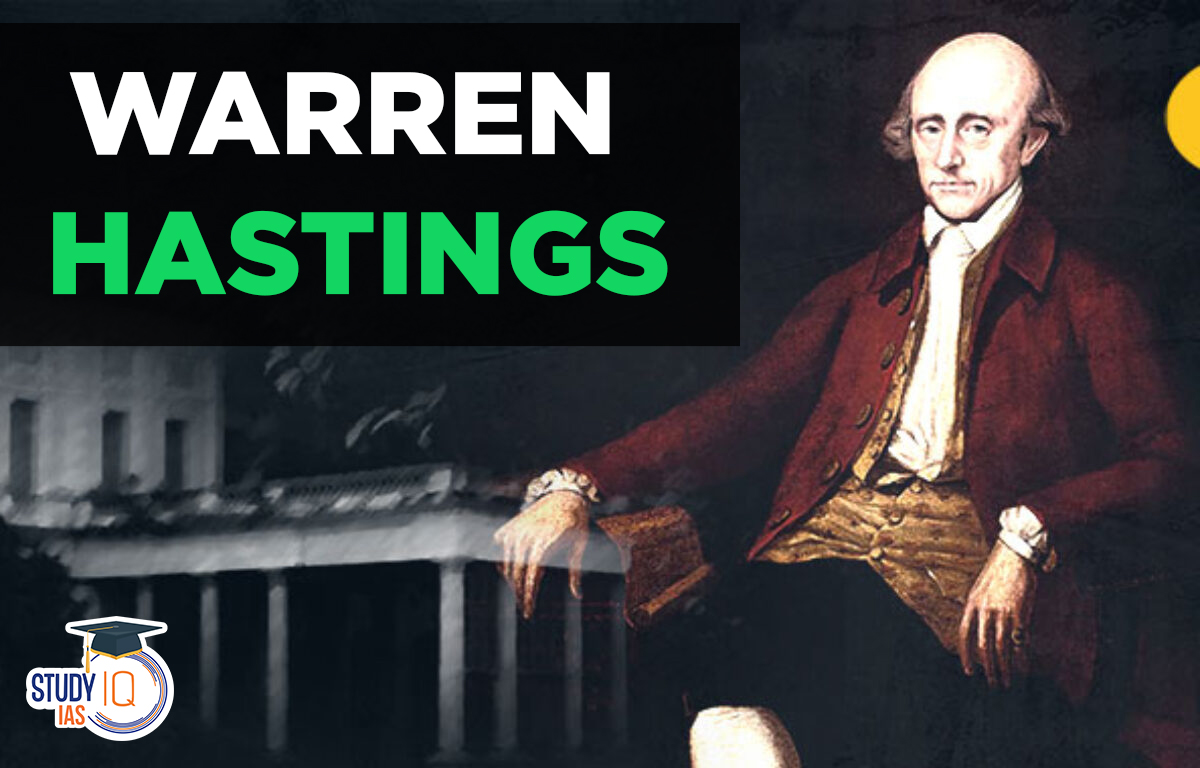Table of Contents
Warren Hastings
When it comes to the British Empire’s reign over India, Warren Hastings is a very significant figure. In the years 1772 to 1785, he served as Bengal’s first governor general. He has always been a person with admirable energy, and he organized things with admirable enthusiasm. Previously, he served as the British President in Murshidabad before becoming the Governor-General (Capital of Bengal).
After the Battle of Plassey, Mir Jafar had just been elevated to the position of Nawab. Additionally, the first and second Anglo-Mysore Wars were fought during his reign. In order to get ready for the UPSC IAS Prelims and Mains test, candidates might read additional NCERT Notes on the History of Modern India.
Warren Hastings Time Period in India
Warren was admitted as a British Resident in the city of Murshidabad in the year 1758. In Bengal, he was given the responsibilities of a representative. However, Bengal at that time was under the control of the East India Company. As a result, they were given the duty of giving the new Nawab rules. On behalf of Robert Clive, he issued directives.
Hastings personally consoled Mir Jafar when he was attempting to establish ties with the native Indians and their leaders. When the East India Company’s troops deposed Mir Jafar in 1760 and installed Mir Qasim as ruler, Hastings established a strong relationship with the new Nawab. He was elected to the Calcutta (current Kolkata) council once more in 1761.
Hastings suspected a few individuals travelling under the unofficial protection of the British flag in 1764 of engaging in extensive fraud and illegal business. Hastings brought this issue before the Calcutta authorities. But after considering his findings, the Council decided to reject Hastings’ suggestions. He received harsh criticism from other members, many of whom had benefited financially from the trade.
After his arrival in London and resignation in December 1764, Hastings stayed in posh areas. He did, however, carry a heavy burden of debt. He then looked for a job at the East India Company in order to pay off his obligations. And despite being initially turned down, he eventually was offered the position of deputy leader in the city of Madras.
Warren Hastings Tenure at Madras & Calcutta
Following the conclusion of the First Anglo-Mysore War, Warren Hastings arrived in Madras. Hastings initiated a number of trading method modifications during his time at Madras. Eliminating middlemen to the benefit of both the Company and the Indian labour was one of the improvements.
Warren supported Robert Clive’s idea that the three principal British administrations—Calcutta, Bombay, and Madras—should be unified under a single authority. Warren Hastings was chosen to lead Calcutta in the year 1771. During his administration, the Bengal Famine, which killed 10 million people, occurred.
The Regulating Act of 1773 was passed in order to provide Bengal control over the Madras and Bombay administrations. Hastings was elevated from Governor to the post of new Governor-General. However, this promotion curtailed his power. The Governor-General was one of the five members of the Supreme Council of Bengal, which was established as a result.
Warren Hastings Policies in India
Dual System Abolition
The East India Company decided to take on the role of Diwan and use its own agents to collect the taxes. Robert Clive’s Dual System was subsequently abandoned. Hastings stopped paying the Mughal Ruler an annual salary and slashed the subsidies to the Nawab in half to improve the Company’s finances.
Revenue Reforms
The Dual system was eliminated, which resulted in the Company assuming responsibility for revenue collection. A Board of Revenue was established in Calcutta to monitor revenue collection in order to achieve this. An English Collector was assigned to each district.
Judicial Reforms of Warren Hastings or Judicial System Reorganisation
The Nawab, who had previously served as the head of the legal system, abused his authority. He made hasty decisions a lot of the time. In their various regions, the zamindars who acted as lower-level judges were incredibly biassed and corrupt. The court system suffered from widespread corruption overall. During his rule, Warren Hastings implemented a number of judicial changes.
Both a civil court presided over by the Collector and a criminal court presided over by an Indian Judge were assigned to each district. Two appellate courts were formed in Calcutta, one for civil cases and one for criminal proceedings. The Governor and two judges selected from his council were to preside over Sadar Diwani Adalat, the highest civil court of appeal.
A judge from India nominated by the Governor-in-Council was to preside over the highest criminal appeals court, Sadar Nizamat Adalat. To assist the judges, experts in Muslim and Hindu law were consulted.
Trade Regulations
Dastak, or the “freebees” system, was abolished by Warren Hastings, who also regulated internal trade. He reduced the number of customs buildings and instituted a standard 2.5 percent levy on goods produced in India and abroad. Company employees continued to conduct private business, but only within legally permissible bounds.
Lord Warren Hastings & Major Wars
1. First Anglo-Mysore War
The First Anglo-Maratha War was fought between 1775 and 1782 between the Maratha Empire and the British East India Company. The British Calcutta Council, headed by Warren Hastings, revoked the agreement that had been signed between Raghunathrao and the Bombay Presidency. With Maratha Ministers, the British Calcutta Council signed a new Purandar Agreement in 1776.
Salsette was retained by the British, while Raghunathrao received the sole pension. By defending Raghunathrao, the British establishment in Bombay broke the Purandar Agreement of 1776. The French were permitted to construct a port on the west coast by Nana Phadnavis, on the other hand. The Marathas, led by Mahadji Shinde, defeated the English in the battle of Wadgaon, which took place close to Pune as a result of the aforementioned struggle. In Wadgaon, India, in 1779, the English were coerced into signing the humiliating Wadgaon Treaty with the Marathas.
2. Second Anglo Mysore War
The second Anglo-Mysore War broke out as a result of a breach of the Treaty of Madras. Significant arguments arose about this between Haider Ali and the British. The second Anglo-Mysore war was the consequence of a chain of events. The British broke the Madras Treaty when Maratha forces invaded Mysore in 1771.
They were challenged by Haider Ali, who accused them of breaking his trust. In addition, Haider Ali found the French to be very attentive in providing the troops with the necessary firearms, lead, and saltpetre. He started doing this by using Mahe, a French territory on the Malabar Coast, to bring French military supplies to Mysore.
The blossoming friendship between the two worried the British. As a result, the British made an attempt to detain Mahe, who was protected by Haider Ali. Haidar Ali made an alliance with the Marathas and Nizam to fight the British.
Warren Hastings Impeachment
In 1788, Warren Hastings’ impeachment by the British Parliament was unsuccessful. During his time in Calcutta, Hastings received a citation for misconduct. It had to do with poor administration and personal vice. The investigation actually took place, and it revealed a wide range of discussions on the role of the East India Company and extending the empire of India. Warren Hastings’ trial was postponed for seven years. When the final decision was made, Hastings was overwhelmingly found not guilty.


 Jallianwala Bagh Massacre, Date, History...
Jallianwala Bagh Massacre, Date, History...
 Important Lakes of India, State wise and...
Important Lakes of India, State wise and...
 Buddhism History, Origin, Sect, Councils...
Buddhism History, Origin, Sect, Councils...





















